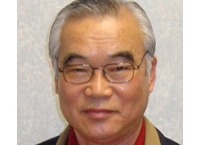The interview with Dr. Bae
델리가게에서 일하던 이민청년은 어떻게 의사가 될 수 있었을까
닥터배와의 인터뷰
Starting out with a dream of becoming a businessman, Kunil Bae started a small business at a grocery store with his family. Never thinking of attending college, he continued this business with his interest in economics remaining in his heart.
Years later, people would start to call him, “Dr. Bae.”
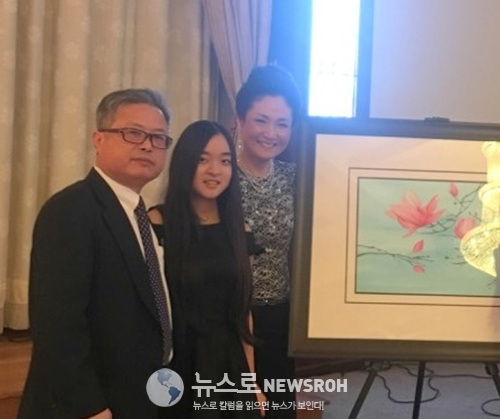
닥터 배근일은 자수성가로 아메리칸 드림을 일군 주인공이다. 고등학교 졸업후 미국에 이민온 그는 델리(야채) 가게에서 힘겨운 이민생활을 할 때만 해도 의사는 커녕, 대학에 들어갈 수 있다는 희망을 품기도 어려웠다.
4년 간 델리 가게에서 가족과 함께 열심히 운영하여 나름대로 성공도 거뒀지만, 인종과 학벌, 직업의 차별을 크게 느끼고 삶의 방향을 전환하는 계기가 되었다. 그래서 고되고 힘들 수도 있지만 타인을 살리고 도움을 줄 수 있을 거라는 확신으로 의사가 되기 위한 길로 들어서게 되었다.
그 당시에는 같은 한인들 중에 진로에 관한 도움과 조언을 구할 수 있는 멘토들이 없어서 외로이 스스로의 힘으로 정보를 찾고 의사의 길을 개척해 나가야 했다.
한 번 의사가 되기로 결심한 후에는 고된 과정 속에서도 초심(初心)을 잃지 않고 의사가 아닌 다른 길은 보지 않았다. 더 쉽게 살 수 있는 인생의 유혹을 물리치고 묵묵히 계획한 바와 소신대로 나아간 것이다.
그는 성공에 대한 정의에 대한 물음에 "목표 설정, 그에 대한 계획과 고된 노력 그리고 성취라는 행복, 그 모든 과정 속에 성공이 있다"고 강조했다.
의사를 희망하는 학생들에게 당부하고 싶은 조언을 구하자 “왜 의사가 되려고 하는 지의 목적을 스스로에게 물어보고 항상 미리 앞서서 준비해 나가는 사람이 되어야 한다”고 했다.
그러면서 그는 "아무리 머리가 좋은 사람이라도 열심히 노력하는 사람을 이길 수 없고, 아무리 노력하는 사람이라도 그 일이나 공부를 즐기는 사람을 이길 수 없다"며 열심히 노력하고 즐길 것을 당부하기도 했다.
살면서 힘든 과정과 도전이 닥쳤을 때, 어떻게 하면 묵묵히 가야할 길을 갈 수 있을까. 닥터 배는 “때로 닥쳐 오는 힘든 시기를 담담히 받아들이고 긍정적으로 대처해 나가야 한다. 그리고 그 과정을 즐길 수 있는 것이 그 길에 대한 열쇠”라고 말을 마무리했다.
닥터 배와의 인터뷰는 불가능을 가능으로 이끌고 꿈은 어떻게 이뤄질 수 있는지 해답을 주는 시간이었다. 의사가 되기까지의 동기와 열정, 그 고된 과정과 성공을 담은 영어 인터뷰를 소개한다.
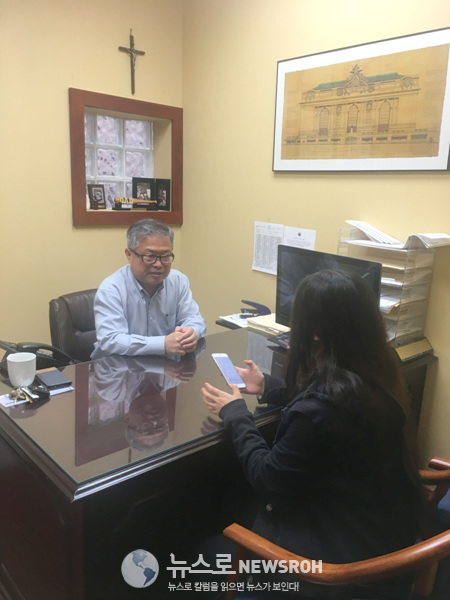
With Dr. Bae at his office
It wasn’t like a dream come true for Dr. Bae, instead it was a big dream later to be achieved. With great stories, came great conversations and lessons. I decided to interview him to explore a peak of his journey from becoming a person who would thank people for buying his products to hearing people thank him for saving their life. In addition to that, I would then be able to know what it is like to be an internist and how it differs from the other specialists in medicine.
I asked him if science was his favorite subject growing up. Almost 79% of students who feel passionate about science as a subject start to grow feelings for that specific area and the career options in that field as well.
“When I was in high school in Korea, my interest was not in science,” he said, “I didn’t think of science as my major. I wasn’t interested and was not good at science either.”
Dr. Bae said his interest was mainly in history and Korean literature which led him to be in the non-science major area in Korea. Even when he came to America, there wasn’t much of a difference.
“When I came to America, I didn’t really think about going to college, or pursue my education. I thought I was going to be a businessman so I never thought of going to college. I started a small business at a fruits and vegetables store with my brother along with my family together. I worked for four years and business was good - we did well. Then four years later, I felt so much discriminated.”
It was after those four years when he realized that the environment around him was a challenge for him.
“Not knowing so much about the American language and having a lack of education made me feel like I was going to be discriminated.”
But, things would start to change in his life once his realization took place. Like a new sequel or an exciting continuation to a book or movie, he decided to take a different - if not better - path.
“I decided to pursue my education and I wanted to study more and get my diploma. That’s when I decided to go to college after four years of work. It took me about one year for preparation. After about several years in America, I got into college. When I went to college, I had to choose my subject and my goal - I had to decide what I was going to study, what my major should be. That was when I was really thinking.”
Dr. Bae thought of a job that could provide him with everything. From financial stability to job security, he wanted respect from other populations and at the same time, help people. Then, he found the missing piece to his puzzle.
“Being a doctor fits everything so I decided to go for medicine. Because medicine wasn’t my initial interest when I was young, it was not easy. In college, we studied basic science. It was okay and I was doing well. But then, when I actually went to medical school and studied medicine, it was not easy since it wasn’t my initial interest. I struggled. But as time past by, I liked it more and more. I adapted to it a little more and eventually, I really liked it. I liked it alot and I think I chose the right position.”
It is definitely not easy for someone like Dr. Bae to become a doctor since it wasn’t his first and ideal dream, but he made it happen. Though things might’ve went at a faster pace, he tried his best and achieved his last-minute goal.
My second question was already answered but I wanted to know why he chose internal medicine as a specialty out of all the other areas in medicine.
He answered, “I was struggling when I was studying so I was thinking that if I choose a sub-specialty like cardiology, oncology, or hematology then maybe I’m going to forget everything except those things that I’m specialized in. For instance, if I choose cardiology then I think I’m going to be very knowledgable on cardiology but I might forget everything else. I studied so hard up to that level and I didn’t want to forget everything. That’s why I decided to become an internist so I can handle everything - maybe not so well - but still I would be able to handle everything in broad areas. I think I chose the right decision.”
It was a smart and wise decision that Dr. Bae made and probably very time-consuming. Studying areas in medicine, especially internal medicine, takes a whole lot of time and effort from my point of view, and I think it is very agreeable since an internist has to collect the information from all the different areas to figure out the problem.
Within all the hard work he put in, I was wondering and asked him if he had someone by his side to help him through his journey and give advice on how to embark on different pathways in life.
After a small pause, he said, “I don’t really think there was any mentor or supporter at the time when I was in school.”
Right away, it amazed me to think that Dr. Bae led his own way of becoming a successful doctor from the start without anyone to support him or build up his pathway. He said there weren’t a lot of Korean people, especially those who were educated, since in the early 1980’s - the time where he went to college - it was hard to find people who were academically skilled.
“I couldn’t ask anybody. There was nobody around me who could give me advice or support. So I had to do everything by myself.”
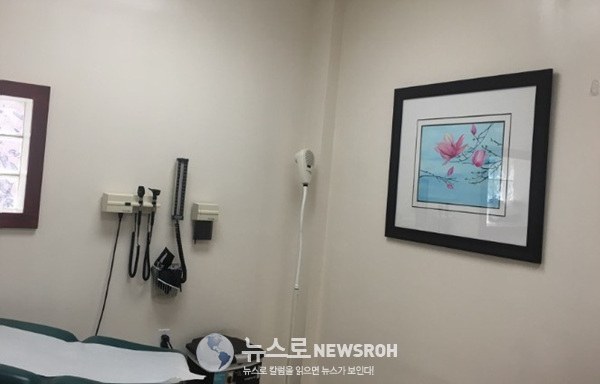
My artwork that Dr. Bae bought during the auction at the KAPIPA gala and the money has been donated to homeless people. The artwork is hung on the wall of the examination room for patients to see and feel calmness and peacefulness while waiting. This made me feel very excited and honored.
Even though this sounded like a challenge, he fought against it and put an immense amount of hard work and effort to earn what he wanted.
“When I applied to college, I had to go to a library to look at all the college informations because I couldn’t find help from anybody else. There were no college graduates from my family since nobody went to college or got a degree. I had to do everything from scratch. I went to the library to get all the college information, applied myself, and took exams by myself.”
Still, going to college was not it - it was rather the beginning.
“Even when I decided to go to college at Boston - I went to UMass - I had to go there, apply, enroll, and find an apartment, find a job, and all those things independently.”
The finish line was yet to be crossed and Dr. Bae was patient and continued to climb the mountain.
“When I decided to go to Medical School, nobody told me to go to Medical School so it was purely my decision, and I didn’t get influenced by anybody. Forty or thirty years ago, there was nobody around. Now a days, there are many doctors, many young people who go to Medical School, and they get so much information from other people. At the time, there wasn’t.
I would say that I didn’t have that much influence from other people.”
But, you still made it Dr. Bae. You eventually crossed the finish line and achieved your last-minute goal through a successful path all by yourself.
Because of the repetitive thought of success in my mind, I thought it to be the right time to ask him what his definition of success is.
He responded, “I think the definition of success is different varying from person to person. My opinion and my view is that when you aim certain things, plan those certain things, work hard, achieve your target, and be happy about it, success will be there.”
Although it was a short definition, there was so much heart given into the small spaces between the words he stated that it was almost a perfect definition for success, not only to those who struggle with challenges in life, but also the ones who have limited chances or access and resources to achieve their goal and fulfill their dreams. Dr. Bae sparked a light of inspiration.
There was so much passion and love visible that he put into his career which led me to ask him if he would change that decision and path he chose.
His answer was simple, “No.”
He continued and told me how a lot of other doctors ask each other those questions frequently, and most of them say that they could’ve done something else. Dr. Bae said how some doctors say that they could’ve gone to Wall Street, become a lawyer but personally, he thinks that this is the perfect job for him.
“I don’t regret it and I don’t think I’m going to change anything.”
Yet, he said there was nothing to change - surprisingly - he had one thing in mind.
“If I had to change anything, then it should’ve been to study harder. I thought I studied hard at the time, but ten or twenty years later now, I felt that I should’ve studied harder. That’s what I regret - sometimes. But, I’m not going to change my profession - I really don’t think I’m going to change anything.”
It was great to see how happy Dr. Bae was with his job and how proud he was of himself. That was supposed to be the end of the interview but because I got so interested, I came up with more questions. I asked:
What advice would you give to upcoming students who are starting from scratch like you did in the past before; such as those who wants to become a doctor?
Right off the bat, he stated, “I think people have to like what they are doing first.”
He said that there had to be some kind of purpose if one wanted to become a doctor. This was absolutely true and reasonable because, according to the present-day society, over nearly 50% of the doctors do it for the money. Without a reason, becoming a doctor would be difficult and people would be struggling, just like Dr. Bae told me.
“Once they become a doctor, they have to prepare from the beginning. That’s what I did.”
He told me how he prepared well for five years in college before going to Medical School. He also told me the differences between people and how some students decide to go to Medical School after spending only about two or three years in college while others take too long because of their grades and the lack of preparation or the lack of good relationships with professors, who are the ones that give recommendation letters. Even after going to Medical School, Dr. Bae believes that they have to prepare and plan ahead for four or five years.
He states, “Without it, it’s tough. You just have to work hard. As we always say, smart people can’t always win against the people who work hard, and those who work hard cannot always win against those who enjoy working. So, work hard and try to enjoy - that’s it. I think that is my advice.”
It was all so true and obvious but it was good to hear Dr. Bae repeat the importance of happiness because a lot of people - especially adolescents - don’t realize that their happiness is more important than what they want to achieve.
Because Dr. Bae is an inspiration who motivates a lot of people to pursue their dreams, I asked the motivator what motivated him to keep going when he faced specific challenges in his life. This would almost give me a chance to look “behind the curtain” and find out what kept him strong.
“Well, sometimes you have to compare with other people,” he responded, “You have to compare your situation with other people’s situation. Sometimes, it gets tough but you have to accept that - that’s life. That is the life that everybody faces from time to time. When you face those difficulties, instead of showing anger or resentment, I think it’s better to overcome with a positive attitude. Sometimes, when I have difficult patients, I try to think about the role of being a doctor, and how I should be able to overcome that.”
He continues, “Everybody in this world has problems. I’m not the only one. I have to think about other people and when you think about it, I’m in a better situation than other people are. I try to enjoy it - enjoying is the key here.”
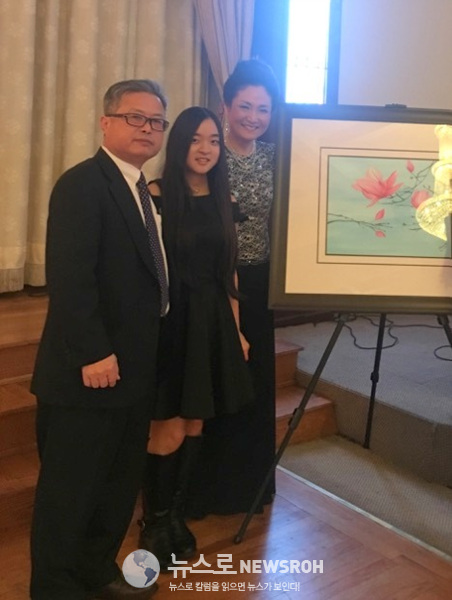
and his wife at the KAPIPA Gala Ceremony.With Dr. Bae
This photo was taken at the KAPIPA Gala Ceremony which was incorporated in 2007 and is currently a network of 100 multi-specialty physician group, who practice in the Greater New York Korean-American community.
After our interview, I felt honored to have the chance of meeting someone like Dr. Bae. It was not only an interview, but a speech that he gave about life lessons and the key to true success. He amazed me with every of his responses and each sentence dropped with more curiosity. From starting a small business at a grocery store and dreaming of becoming a businessman to becoming a successful internist and helping people every day, Dr. Bae was one of the one percent of the doctor population and I was honored to hear his inspiring “speech.”
* '글로벌웹진' 뉴스로 칼럼 'Claudia’s Web of Wonder'
http://www.okja.org/index.php?mid=saseol&category=2234&act=dispBoardWrite
- |
- 사본 - new FullSizeRender (2).jpg (File Size:66.8KB/Download:47)
- IMG_3910.jpg (File Size:88.1KB/Download:46)
- new FullSizeRender.jpg (File Size:85.3KB/Download:45)
- 사본 - FullSizeRender.jpg (File Size:51.7KB/Download:42)







